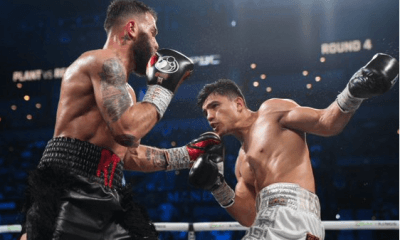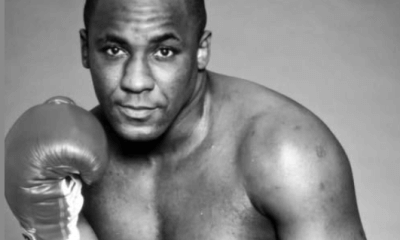Articles of 2006
Davis Miller’s Songs of Innocence and Experience
“We struggle. Always. We are doing the best that we can. And we dream of transcendence.” – Davis Miller
“We admire them, we envy them, for great qualities which we ourselves lack. Hero worship consists in just that.” – Mark Twain
Some people are able to lift and inspire others. A sight of them is often enough to fill observers with hope while illusions of their heroism are safely preserved through remote distance. They are made into heroes because they embody qualities that others wish they had within themselves or may develop in the future. Hero worship is the worship of an image, an unrealised, projected self. When the observer first becomes conscious of the hero, it is as if the hero has already arrived into the world both fully-formed and perfect.
Davis Miller has written extensively about his childhood heroes, particularly Muhammad Ali, in his three books: The Tao of Muhammad Ali, The Tao of Bruce Lee and The Zen of Muhammad Ali. He’s also written for such magazines as GQ, Rolling Stone, Sports Illustrated, Esquire and Arena; been nominated for a Pulitzer Prize, won the award for best essay published in an American Newspaper Magazine (1989) and been anthologised in The Best American Sports Writing of the Century.
Miller’s interest in Muhammad Ali began in January 1964 as Cassius Clay was preparing to meet Sonny Liston for the first time. Miller’s mother, who had been ill for a number of years with an undiagnosed kidney disease, had recently died leaving Miller and his younger sister Carol in the care of their father.
The adolescent Miller; underdeveloped, grieving and bullied; saw in Cassius Clay something that changed his life. “I first saw Ali when he […] had recently turned twenty-two, and heat rose shimmering around his sleek, hard body as he prepared to meet Sonny Liston for the world heavyweight championship. I remember sitting mesmerised in front of Daddy’s small black-and-white television as Clay’s voice roared and crackled from the huge world outside and through the TV’s rattling three-inch speaker.” The die is immediately cast. “Since then, many of the events that have defined my life have been related to Ali.”
Ali’s appearance to Miller is akin to that of a god from a dream we only barely remember. Holding court from the TV set, the Ali of 1964 was, as Ferdie Pacheco once said, the epitome of human perfection and this physical beauty, his prettiness, extended into the ring. He neither appeared as destructive as Liston or exhibited the erratic vulnerability of Patterson. Ali, for the first half of his career, moved around the ring like a stone skimmed over water and his opponents were overwhelmed, not with concussive one-punch power, but with punches that flowed like silk in combination.
The cultural climate changed as the 1960s became the 1970s. The Democrats were seen out of the White House by the Republicans, the Summer of Love ended. Muhammad Ali lost and then regained his license, lost to Joe Frazier and then regained his championship from George Foreman while everybody believed that he was travelling on the descent of his career. More importantly, Ali went from the world’s most famous pariah to its most venerated icon.
In 1975, as Ali was preparing to meet Joe Bugner, Miller climbed to the top of a mountain in Pennsylvania to spar with his idol. Ali, the world heavyweight champion, was holding an open training session at his Deer Lake Camp; Miller was a junior-lightweight in the beginning stages of a kickboxing career. As Miller climbed into the ring, he was introduced by Ali as a master of Karate (he wasn’t). Face-to-face with Ali, Miller was distracted by his years of worshipping the bigger man: “I recognise once again that no one else on the planet looks quite like him. His skin is unmarked and is without wrinkles, and he glows in a way that cannot be seen in photographs or television.”
In what seems less than a single minute of a round, Ali dodges Miller’s kick, dances around the ring, takes a hard strike off the diminutive future writer and then stuns his opponent with a single jab. Putting his arm around Miller’s shoulders, Ali escorts him from the ring telling him “You’re not as dumb as you look. You’re fast. And you sure can hit to be so little.”
As Miller reflected later, “He may as well have said he was adopting me.”
The sparring session formed the basis for Miller’s first published piece which ran in Sports Illustrated. By the mid-eighties however, Miller had long given up on writing as a full-time career and had settled in Louisville, Kentucky with his family. He was working as the district manager of a video rental chain, all the time aware that he was in Ali’s hometown. Then, one day, it happened. As he was driving past Ali’s mother’s house he noticed a ‘block-long White Winnebago with Virginia plates parked out-front’ and instinctively knew that Ali was inside. Although in The Tao of Muhammad Ali, Miller states that the meeting took place in 1989, he revealed to me that it had actually occurred earlier in 1988. Ali had been retired for eight years and his Parkinson’s was a publicly-known fact. Usually, the saddest part of growing up is seeing our childhood heroes broken-down in the present day.
“I wasn’t at all disappointed in Ali when I met him in 1988 or at any time thereafter,” Miller told me. “Spending serious time with Ali I learned that he was no less Ali because of his infirmity. That was heartening.”
Over the next eight years until The Tao of Muhammad Ali, Miller and Ali remained in close contact, meeting in locations such as Louisville, Berrien Springs, Las Vegas, Miami and Philadelphia. Ali consoled Miller when his father died and welcomed Miller’s kids into his home, even allowing them to stay over.
According to Miller, the relationship soured in 1996 after he sent an initial version of The Tao of Muhammad Ali to Ali and his wife. Phoning to receive their reactions, Miller was surprised at the coldness of Lonnie Ali. “Lonnie answers the phone. When she recognises my voice, I feel her go cold; the phone suddenly gets heavier in my hand. This is not a situation I’ve had with her before.” After a brief, terse conversation, the phone-call and the relationship between Miller and the Alis is over. Miller no longer has any contact with the man he later labelled his ‘childhood idol, mentor and friend.’
Yet Miller, ten years later, says that he harbours no ill feeling toward the Ali camp. “I’ve never been upset or angry with Ali,” he told me. “For years I was frustrated and resentful that Lonnie Ali misunderstood what I’d done with The Tao of Muhammad Ali. That troubles me still.
“Over the past year, I’ve found myself thinking abut Ali again, and in tender ways.”
The subtitle for William Blake’s Songs of Innocence and of Experience is ‘Showing the Two Contrary States of the Human Soul.’ Blake reasoned that one state cannot exist without the other; I see life as a progression from an infant state of Innocence to an adult state of Experience, the difference between the latter and the former the presence of regret.
Davis Miller’s Song of Innocence is his childhood adulation of Ali, the physical poet led by his own spirit into exile. “Like almost everyone else born before 1970, I can’t help but remember a time when Ali seemed to be constantly moving inside a private and wondrous rhythm, when his eyes shone like electric blackberries, when heat shimmered from his almost perfectly symmetrical torso. The young Ali’s seemingly endless energy promised that he would never get old.”
And, after Innocence – Experience brought about by the end of the relationship. As Miller discovered, Ali, who had danced across the ring so gracefully, is essentially human – the same as the rest of us. If Innocence is the admiration of the hero and the joy taken in the image, then Experience, the realisation that our heroes are human as well, should come inevitably as a disappointment.
Not according to Miller. “I learned that he was no less Ali.”
Muhammad Ali, the greatest boxer in history, a three time heavyweight champion took Miller from Innocence to Experience. But the real hero in Miller’s life lay much closer to home.
Roy L. Miller was an ordinary man with the decency of a loving father. As a young man, he had turned down multiple offers of college scholarships to play baseball; instead, he married Sara, his childhood sweetheart and worked for the rest of his lie in a corrugated box factory in the same small town in Carolina. As other jobs came and went, he stayed put in order to give his children stability. Before she died at the age of thirty-two, Sara Miller made him promise that he would ensure that their two children, Davis and Cheryl, received college educations. It was a promise that he kept. In the late eighties, when his son lost his job, Roy Miller sent the family a cheque for an amount he couldn’t afford on his wages. Soon after, he died of heart failure; one of his final wishes was that Miller not tell his sister that he was in the hospital; he didn’t wish to have her worry.
After his death, he reached out still to help his children with two large insurance cheques. The money granted Davis Miller the time to write, enough time to find out if he was truly a writer. “He would allow me the opportunity he’d not had,” Miller wrote, “The chance to do something with life apart from work some half-ass job.”
Miller sums up his father with simple logic. “Daddy would never be Muhammad Ali or Johnny Unitas or Mickey Mantle, or any of the other folks people idolise and buy books about. Much of the best of who I am is directly because of my Dad. Growing up stoically during the Depression and World War Two in the industrial South, the son of alcoholic parents, and losing his only childhood sweetheart when they were both so young, I still marvel at his uncommon tenderness.”
William Blake believed that Innocence and Experience were the only two states of the human soul, each complementing the other. It’s easy to disagree; I argue that there is a third stage: Wisdom – the knowledge that genuine heroism is not leaping over tall buildings or winning sports championships but the consistent, unsung application of unconditional love and sacrifice.
“My Dad is the hero of my books.” – Davis Miller, again.
“That a person can really be a hero to a near and familiar friend is a thing which no hero has ever yet been able to realize, I am sure.” – Mark Twain, again.
-

 Featured Articles4 weeks ago
Featured Articles4 weeks agoA Night of Mismatches Turns Topsy-Turvy at Mandalay Bay; Resendiz Shocks Plant
-

 Featured Articles2 weeks ago
Featured Articles2 weeks agoAvila Perspective, Chap. 330: Matchroom in New York plus the Latest on Canelo-Crawford
-

 Featured Articles1 week ago
Featured Articles1 week agoVito Mielnicki Jr Whitewashes Kamil Gardzielik Before the Home Folks in Newark
-

 Featured Articles4 weeks ago
Featured Articles4 weeks agoRemembering the Under-Appreciated “Body Snatcher” Mike McCallum, a Consummate Pro
-

 Featured Articles4 weeks ago
Featured Articles4 weeks agoAvila Perspective, Chap 329: Pacquiao is Back, Fabio in England and More
-

 Featured Articles3 weeks ago
Featured Articles3 weeks agoOpetaia and Nakatani Crush Overmatched Foes, Capping Off a Wild Boxing Weekend
-

 Featured Articles3 weeks ago
Featured Articles3 weeks agoFabio Wardley Comes from Behind to KO Justis Huni
-

 Featured Articles2 weeks ago
Featured Articles2 weeks agoCatching Up with Clay Moyle Who Talks About His Massive Collection of Boxing Books
















